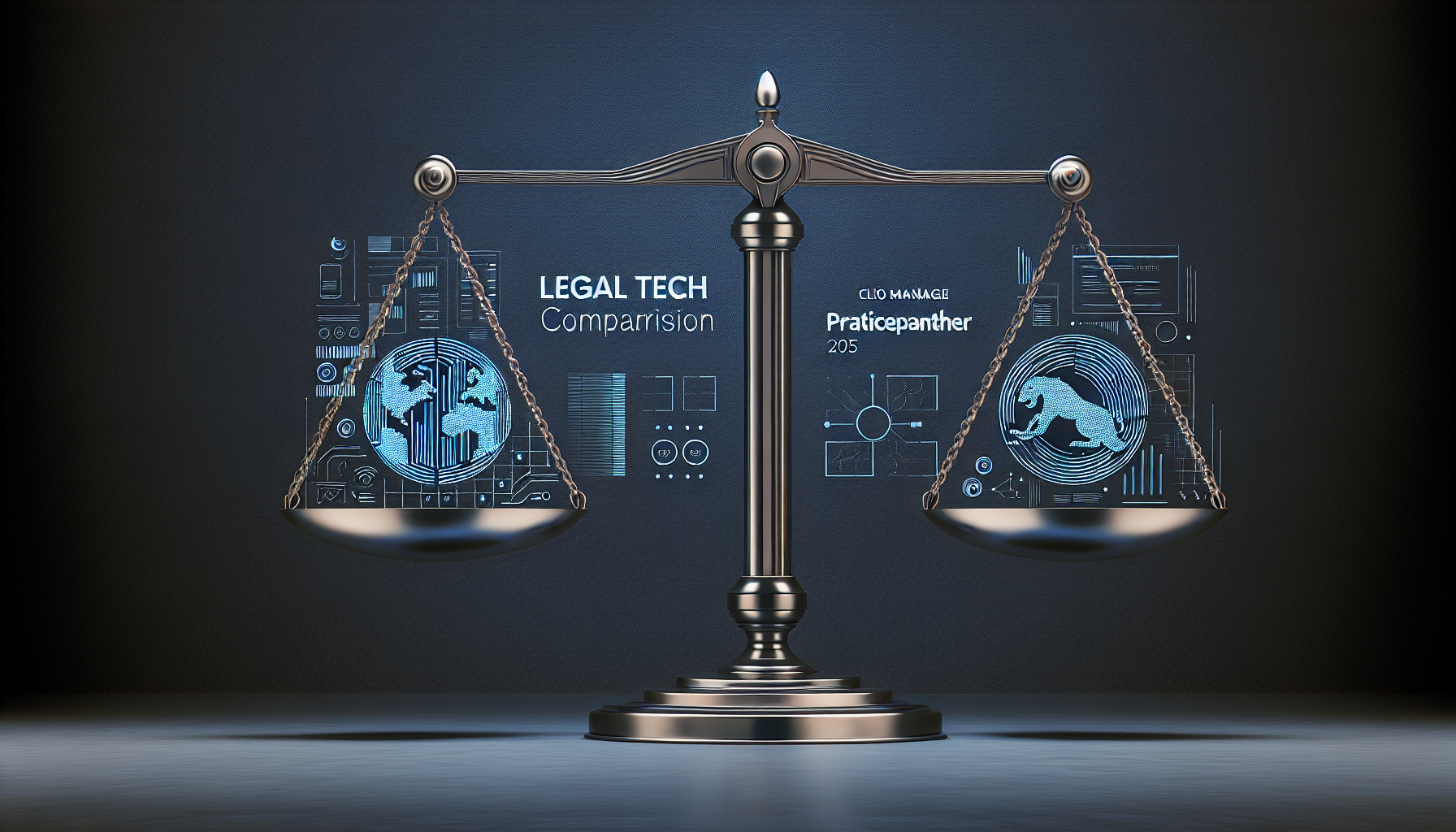Clio Manage vs PracticePanther: A 2025 Legal Tech Comparison on AI, Compliance, and Client Service
Choosing the right legal practice management software is pivotal for modern firms balancing compliance, profitability, and client expectations. Clio Manage and PracticePanther are two leading platforms. This article compares them through a legal-operations lens—with an emphasis on emerging technology and AI—so attorneys can match features to real workflow needs while minimizing risk and maximizing ROI.
Introduction & Context
Law firms are under pressure to be faster, more accurate, and more transparent—without compromising confidentiality or compliance. Practice management platforms are evolving to support this reality with automation, built-in payments, and emerging AI capabilities for drafting, summarization, and analytics. Clio Manage and PracticePanther are often shortlisted by firms seeking cloud-based, all-in-one solutions that scale from solo practices to multi-office teams.
Why This Comparison Matters for Legal Professionals
Adopting or switching core systems is a high-stakes decision with operational, ethical, and financial implications. Comparing these platforms through a legal-tech strategy lens helps firms:
- Align technology with practice area workflows and jurisdictional requirements.
- Reduce risk exposure in trust accounting, confidentiality, and data governance.
- Leverage automation and AI responsibly for measurable efficiency gains.
- Control total cost of ownership (TCO) while improving attorney and client experience.
Platform Overviews
Clio Manage
Clio Manage is a widely adopted cloud-based legal practice management platform known for its robust ecosystem and frequent product innovation. It covers matter management, time and billing, trust accounting compliance tools, payments, calendars, document automation, and integrations with Microsoft 365, Google Workspace, and many legal-specific apps. Clio has been actively introducing AI-enabled features (such as the Clio Duo initiative and integrations with its document tools) designed to streamline drafting and matter insights.
PracticePanther
PracticePanther is a cloud practice management solution built to simplify the day-to-day: matters, tasks, timekeeping, billing, trust accounting, and communications. It offers strong workflow automation, built-in payments (PantherPayments), and integrations with common legal and productivity tools. While it emphasizes usability and automation, its AI capabilities are best understood as evolving; many firms pair PracticePanther with third-party AI via integrations like Microsoft 365 or Zapier-based connectors.
Feature-by-Feature Comparison
| Criteria | Clio Manage | PracticePanther | Notes for Regulated Practices |
|---|---|---|---|
| Interface & Usability | Modern, frequent updates | Clean, intuitive | Both are cloud-first; test with paralegals/staff for adoption |
| Timekeeping & Billing | Robust timers, batch billing | Robust timers, batch billing | Supports common fee arrangements in both platforms |
| Trust Accounting Tools | Strong compliance features | Strong compliance features | Verify jurisdictional trust rules and reporting |
| Native Payments | Clio Payments (IOLTA-aware) | PantherPayments (IOLTA-aware) | Confirm split deposits and chargeback handling |
| Document Automation | Template merge fields; document tools | Templates; automation workflows | Assess template breadth and clause controls |
| Client Intake & CRM | Clio Grow add-on for intake/CRM | Built-in intake forms and automations | Consider intake complexity and e-sign flow |
| AI & Emerging Tech | Active AI initiatives; integrations | Evolving AI; strong 3rd-party pairing | Validate feature availability and data handling |
| Integrations & Ecosystem | Extensive marketplace | Solid integrations; Zapier support | Check eDiscovery, litigation, accounting links |
| Reporting & BI | Built-in dashboards; exports | Built-in dashboards; exports | Evaluate matter-level KPIs, WIP, realization |
| Mobile Apps | iOS & Android | iOS & Android | Test offline workflows and dictation |
| API & Customization | Mature API; many partners | API/Zapier; automation center | Critical for multi-system environments |
| Data Migration | Assisted migrations available | Assisted migrations available | Plan mapping for matters, trust, documents |
| Pricing Model | Per-user tiers; add-ons | Per-user tiers | Confirm tiers, add-ons, and payment fees |
| Free Trial | Commonly offered | Commonly offered | Use real sample matters in trials |
| Support & Training | Strong support; community | Strong support; onboarding | Evaluate response SLAs and resources |
Usability & Adoption
Both platforms prioritize user-friendly design. Clio’s interface emphasizes quick access to recent matters, timers, and billing workflows and benefits from a large community producing tips and best practices. PracticePanther’s clean layout and automation shortcuts make it approachable for firms standardizing repeatable tasks. In either case, run a pilot with timekeepers and support staff; adoption hinges on keyboard-driven time capture, minimal clicks, and predictable navigation.
Compliance, Security, and Trust Accounting
Compliance is non-negotiable. Both systems offer tools for managing IOLTA/trust accounts, evergreen retainers, and proper allocation of fees. Assess the following:
- Granular user permissions and audit logs.
- Trust balance safeguards and three-way reconciliation support.
- Encryption in transit and at rest; role-based access control.
- Document retention settings and data residency options where relevant.
Firms with strict regulatory needs should request documentation on SOC audits, incident response, and payment chargeback handling for trust accounts.
AI & Automation: Where Each Platform Stands
Clio has been rolling out AI-related features and enhancing document workflows, aiming to help with drafting, summarizing, and matter intelligence. PracticePanther emphasizes automation of tasks, intake, and communications and can pair effectively with third-party AI tools via integrations. For both, validate:
- How AI features are activated, audited, and controlled at the firm level.
- Data handling: what is transmitted to third-party AI, anonymization, and retention.
- User-level permissions for AI outputs and quality controls (templates, clause libraries).
Integrations & Ecosystem
Clio offers a very large marketplace and established API partners across accounting, eDiscovery, court rules, and document tools. PracticePanther integrates with key productivity platforms and supports Zapier, enabling no-code automation with email, calendars, and AI providers. For multi-system firms (e.g., specialized litigation or IP practices), breadth of integrations may favor Clio; for standardized workflows with targeted add-ons, PracticePanther’s automation paired with Zapier can be sufficient and cost-effective.
Pricing & Total Cost of Ownership (TCO)
Both platforms use per-user, per-month tiered pricing with discounts for annual commitments. Consider the following to understand TCO beyond the sticker price:
- Included vs. add-on features (e.g., intake/CRM, advanced reporting, AI, or document tools).
- Payment processing fees and chargeback policies for trust deposits.
- Migration costs, training time, and expected productivity gains.
- Integration costs for third-party tools (e.g., document assembly or BI dashboards).
Always confirm current pricing on vendor sites; tiers and feature bundles change.
Scalability & Performance
Both systems scale for small to mid-sized firms; Clio’s ecosystem and API depth often appeal to larger, multi-office practices planning extensive integrations or analytics. PracticePanther’s automation features make it attractive to firms standardizing common workflows (e.g., PI intakes, immigration, family law) with high case volumes and repeatable tasks.
Support & Training
Both vendors provide onboarding assistance, knowledge bases, and customer support. Clio also benefits from a large community, conferences, and an ecosystem of certified consultants. PracticePanther offers strong documentation and direct training. Assess response times, live chat availability, and the depth of training resources for your specific practice areas.
Pros & Cons of Each Platform
Clio Manage: Pros
- Extensive integration marketplace and mature API.
- Strong trust accounting safeguards and reporting.
- Active development on AI and document automation.
- Large user community, training resources, and partner network.
Clio Manage: Cons
- Some advanced capabilities may require add-ons or higher tiers.
- Configuration depth can increase implementation time without guidance.
PracticePanther: Pros
- Clean, intuitive interface with powerful automation workflows.
- Built-in payments optimized for legal trust compliance.
- Effective use of Zapier and integrations for expanding capabilities.
PracticePanther: Cons
- AI features are evolving; firms may rely more on third-party AI tools.
- Integration breadth is solid but not as extensive as Clio’s marketplace.
Use Cases & Scenarios for Attorneys
- High-volume consumer practices (e.g., immigration, PI, family): PracticePanther’s automation and intake forms can standardize repetitive workflows and reduce manual follow-ups.
- Multi-practice firms with complex tech stacks: Clio’s ecosystem and API breadth facilitate integrations with specialized tools (e.g., court rules, advanced BI, or eDiscovery connectors).
- Boutique litigation: Both platforms support matter-centric collaboration, timekeeping from mobile, and reliable trust accounting; choose based on integration needs and document automation depth.
- Firms pursuing AI-assisted drafting and insights: Clio’s active AI roadmap and document tools may offer a faster on-ramp, while PracticePanther pairs well with Microsoft 365 and Zapier for custom AI flows.
- Client submits intake form with key facts and documents.
- Automatic conflict check and matter creation.
- Template-based task list assigns deadlines and responsibilities.
- Document automation merges client data into first-draft forms.
- Optional AI summarizes intake to a matter brief for attorney review.
- Attorney edits draft; send for e-sign; log time automatically.
- Invoice generated with trust retainer allocation and online payment link.
Step-by-Step Tutorial: Build a Compliant Intake-to-Draft Workflow in Clio Manage
This hands-on guide helps you pilot a streamlined workflow that captures client data, automates tasks, and produces a first-draft document. You can complete a meaningful test in under an hour using demo data. Optional steps show how to incorporate AI responsibly via linked tools.
-
Create a Test Matter
- In Clio Manage, click New > Matter.
- Name it “Demo Intake Workflow – [Practice Area].”
- Add a test contact (never use real client data for pilots).
-
Configure a Task Workflow (Task List)
- Go to Settings > Task Lists (Workflows) > New Task List.
- Add tasks such as “Conflict Check,” “Retainer Request,” “First-Draft Document,” and “Client Signature.”
- Set relative due dates (e.g., Conflict Check: Due Day 0; Draft: Due Day +2).
-
Attach the Task Workflow to the Matter
- Open the test matter and select Add Task List.
- Assign tasks to a responsible attorney or paralegal.
-
Build a Simple Intake Template (Without PII)
- Draft a short intake questionnaire in your document editor using placeholder data fields you intend to map (e.g., Client First Name, Address, Facts Summary).
- Identify which fields already exist in Clio (contact/matter custom fields) and which you need to create.
-
Create Custom Fields
- Go to Settings > Custom Fields > New.
- Create fields like “Matter Summary,” “Key Dates,” or “Opposing Party.”
- Group fields into a “Practice Area” set so they can be applied consistently to relevant matters.
-
Enable Document Automation
- Prepare a .docx template with merge codes corresponding to your contact and custom fields (e.g., placeholders for client name, address, facts).
- Upload your template to Documents > Templates.
- Map fields according to the platform’s merge field list to ensure accurate data population.
-
Generate Your First Draft
- From the Matter > Documents > New from Template, select your template.
- Review the generated draft for field accuracy; correct any mapping issues.
-
Automate Notifications and Deadlines
- Add relative due dates and reminders to the “First-Draft Document” and “Client Signature” tasks.
- Turn on email or in-app notifications for assigned users.
-
Optional: Integrate E-sign and Payments
- Attach your engagement letter as a template-enabled document.
- Send for e-sign using your preferred e-sign tool integrated with Clio.
- Include a payment link for retainer via Clio Payments, routed per trust-compliant settings.
-
Optional: Add AI-Assisted Summaries Safely
- Export or copy the intake “Facts Summary” and use your firm-approved AI tool (e.g., Microsoft 365 Copilot) to generate a concise matter brief.
- Apply your firm’s AI policy: remove personal identifiers unless strictly necessary, review outputs carefully, and attribute final authorship to the attorney.
- Paste the sanitized summary into the matter’s “Matter Summary” field for quick reference.
-
Track Time Automatically
- Start a timer when drafting or reviewing documents.
- Use activity categories for consistency (e.g., “Drafting” vs. “Review”).
-
Measure the Pilot
- Compare time-to-first-draft before and after the workflow.
- Review error rates (misfiled documents, incorrect fields) and adjust templates/fields.
- Document repeatable steps and roll out to your practice area.
This pilot demonstrates a realistic path to efficiency: standardized data capture, automated tasks, compliant payments, and optional AI summaries—all with human oversight and clear auditability.
Expert Insights & Ethical Considerations
Best practice: Treat AI as a junior assistant, not an autonomous drafter. Require attorney review, preserve original sources, and log who reviewed what and when. Maintain an internal style and citations guide to prevent subtle drift in legal standards.
Compliance tip: Trust accounting must remain airtight. Before enabling online payments, confirm how retainers, chargebacks, and processing fees are handled to preserve IOLTA integrity and jurisdictional compliance.
Governance reminder: Adopt a written AI and data policy covering approved tools, redaction standards, client consent (where applicable), and prompt incident reporting. Train staff and audit periodically.
Conclusion & Recommendation
Clio Manage and PracticePanther both deliver strong cloud practice management foundations. Choose Clio if you need extensive integrations, an active AI roadmap, and scalable workflows across multi-system environments. Choose PracticePanther if you prioritize streamlined automation, intuitive intake, and a focused toolset that pairs well with third-party AI. Pilot with realistic matters, measure time-to-value, and formalize governance to ensure ethical, compliant gains.
Want expert guidance on improving your legal practice operations with modern tools and strategies? Reach out to A.I. Solutions today for tailored support and training.





